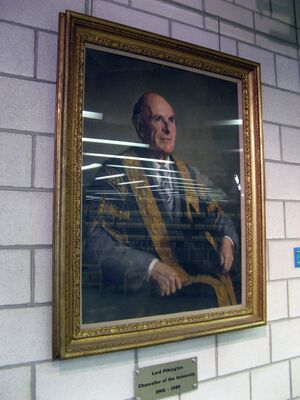Many thanks to our Patrons who cover ~2/3 of our hosting bill. Please join them if you can.
Harry Pilkington
Jump to navigation
Jump to search
( businessman) | ||||||||||
|---|---|---|---|---|---|---|---|---|---|---|
 | ||||||||||
| Born | 29 April 1905 | |||||||||
| Died | 23 December 1983 (Age 78) | |||||||||
| Nationality | UK | |||||||||
| Member of | Pilkington Committee on Broadcasting | |||||||||
Attended the first Bilderberg as President of the Federation of British Industries, and two more in the 1950s
| ||||||||||
Baron Harry Pilkington was a UK industrialist.
Activities
In 1954 Pilkington attended the first Bilderberg.
Events Participated in
| Event | Start | End | Location(s) | Description |
|---|---|---|---|---|
| Bilderberg/1954 | 29 May 1954 | 31 May 1954 | Netherlands Hotel Bilderberg Oosterbeek | The first Bilderberg meeting, attended by 68 men from Europe and the US, including 20 businessmen, 25 politicians, 5 financiers & 4 academics. |
| Bilderberg/1956 | 11 May 1956 | 13 May 1956 | Denmark Fredensborg | The 4th Bilderberg meeting, with 147 guests, in contrast to the generally smaller meetings of the 1950s. Has two Bilderberg meetings in the years before and after |
| Bilderberg/1959 | 18 September 1959 | 20 September 1959 | Turkey Yesilkoy | The 8th Bilderberg and the first in Turkey. 60 guests. |
Many thanks to our Patrons who cover ~2/3 of our hosting bill. Please join them if you can.